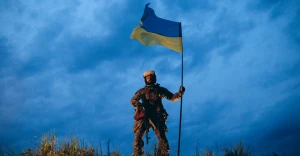
Munich (in)security conference: New challenges and shifts in global politics
The speech by Vice President J.D. Vance, delivered in Munich, reflected the new political trends of President Trump's administration
His words left fear and uncertainty in their wake. Ukrainian President Volodymyr Zelenskyy's speech addressed security prospects in an entirely different light: he urged Europe to unite, mobilize, and finally create an integrated military system – the European Army – with the Ukrainian army as its inseparable component.
These two seemingly opposite speeches were actually about the same thing: the necessity of responding to new realities. The lack of discussion on the real threat that continues to come from Russia does not negate this reality. While the messages from the American and Ukrainian leadership were delivered with different tones, they complemented each other.
J.D. Vance began his speech with harsh criticism of Europe, accusing its partners of not adhering to democratic standards and engaging in censorship, and also directly stated that external threats facing the continent would no longer be a priority for American policy. This means one thing: the U.S. is gradually stepping back from its role as the main guarantor of European security.
Standing before the already shocked Europeans, Zelenskyy urged them to unite and prepare for war. During a more informal conversation, the Ukrainian leader stated that Ukrainian intelligence had data on a likely scenario of Russia's invasion of Poland or another NATO country as early as next year.
This is evidenced, in particular, by Russia's plans to create 15 new divisions in Belarus – and this grouping could be used for such an attack and to restore the Leningrad military district at the end of last year.
Read also. European leaders stunned: Macron calls emergency summit in Paris
The speech by the U.S. Vice President, which likely marks the beginning of the weakening of transatlantic dialogue, demonstrated one important thing: the European assessment of real threats and risks has always been detached from reality. It was just a matter of time before someone said this out loud. Likewise, a possible change in rhetoric by the U.S. administration after Donald Trump's second victory should be considered one of these risks.
The only way to avoid war remains the old formula of the Roman military writer Flavius Vegetius Renatus, the author of the famous phrase: "If you want peace, prepare for war" (Si vis pacem, para bellum). And if Europe and the U.S. are still hesitating about how to act according to this principle, Russia has long been applying it as aggressively as possible in Europe. However, in its version, it takes on a distorted meaning: "to avoid war on your own territory – start it on someone else's."
Moscow is waging this war on a full scale, using all possible means – from subversive activities and terror to manipulative propaganda and hybrid pressure. Just recently, the American publication The Wall Street Journal reported that Russia has created a new secret unit called the "Special Tasks Department" (SSD), which is responsible for carrying out diversions and attacks within Europe and beyond its borders.
In addition, it is important to remember the economic and political pressure from the Kremlin. This includes constant attempts to weaken sanctions, both through indirect political blackmail and by using so-called "good Russians," or exerting pressure on European business groups; energy blackmail, particularly visible around the suspension of Russian gas transit through Ukrainian territory; political games to support populist political projects and the creation of far-right "turncoat" parties that will undermine European stability from within.
In these conditions and such an atmosphere, the most important issue continued to be discussed – negotiations with Russia to establish peace. U.S. Special Representative Keith Kellogg insisted that sooner or later Ukraine would have to sit down at the negotiating table with Russia. Furthermore, the U.S. is convinced that dialogue with Russia is inevitable under any circumstances. Simultaneously with these statements, Politico reported on planned contacts between Russian and U.S. representatives in Saudi Arabia, where Zelenskyy traveled right after Munich.
In response to this, the President of Ukraine stated that he knew nothing about it and that the Ukrainian side had not been invited to any discussions in the coming days. Moreover, these words were confirmed by anonymous sources in the Ministry of Foreign Affairs and the Ukrainian delegation in Munich. But in any case, Ukraine's experience clearly shows that for Russia, negotiations are just another form of waging war. This is especially true considering the preparation of a new offensive contingent on the Belarusian front.
Russia would be interested in making the conflict chronic, dragging it into a "semi-peace," where half-hearted solutions and concessions would replace real political and economic processes. The Kremlin's plan is simple and unchanged: a hidden ceasefire without real cessation of hostilities, where officially the fire supposedly ceases, but Russian troops remain in place, sanctions are lifted under the pretext of the Kremlin's participation in "peace talks," and Ukraine's NATO and EU membership is postponed until a later time, "for better days."
This is a classic tactic of Russian imperial warfare – prolonged attrition of the enemy, dragging them into a hopeless status quo, creating a situation where forces drain away into nothing, like water through a sieve. Europe must adopt a hard line, as the expansion of the war into NATO countries is becoming an increasingly realistic scenario.
If Ukraine gains a clear role in European defense, the Kremlin will, of course, continue to seek alternative ways of exerting pressure and will strike where the West is most vulnerable. Dark times are just beginning, but that doesn't mean they are hopeless.
Exclusivelly for Espreso
About the author. Marianna Prysyazhniuk, political analyst at the Ilko Kucheriv Democratic Initiatives Foundation
The editorial board does not always share the views expressed by blog authors.
- News











































